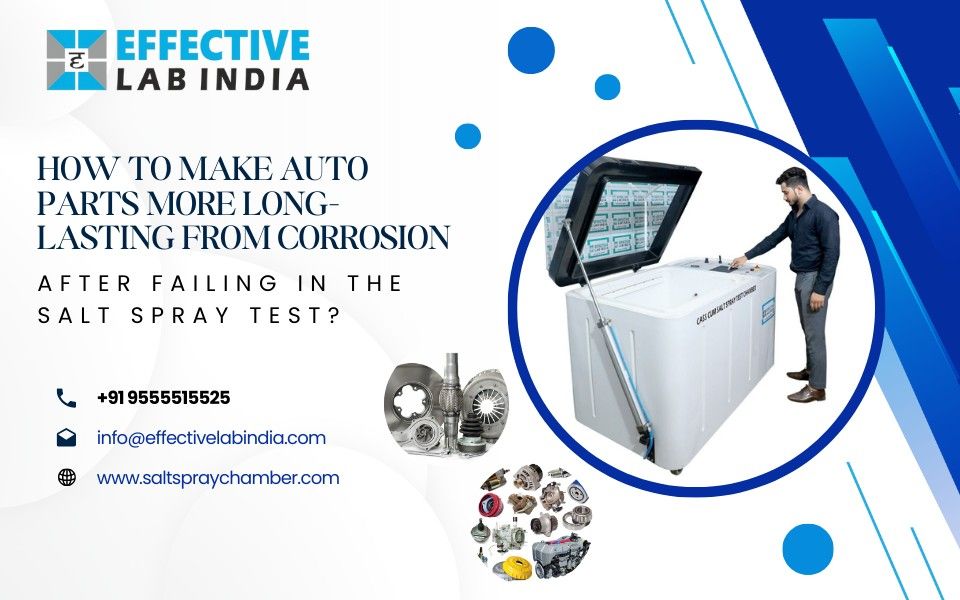by: Effective Lab India /salt spray test / Updated at: 2025-02-20 05:43:55

Corrosion is a serious challenge for car parts, especially in contact with a stiff environment. Many manufacturers use a clear lacquer coating to protect the metal surfaces, but some parts still fail before they reach the standard time in the salt spray chamber. So, how can we make car parts more corrosion-resistant? Find ways to increase durability and prevent initial failure.
What is a Salt Spray Test?
The salt spray test chamber is an important tool used to assess the corrosion resistance of metal coatings in industries. It exposes the material in a saltwater environment and mimics tough conditions that car parts can cope with in real-world applications.
Why Do Some Auto Parts Fail in the Salt Spray Test?
Lacquer-coated vehicle parts break down too quickly in the salt spray fog test chamber for several reasons:
Weak surface preparation: Residues and contaminants reduce adhesion.
Low-quality lacquer: The degree of protection offered by coatings varies.
Environmental factors: Extreme temperature swings and high humidity accelerate corrosion.
Ways to Improve Corrosion Resistance of Auto Parts
Enhancing Lacquer Coatings
It is important to choose high-quality lacquer. It should be resistant to UV light, moisture, and aggressive chemicals.
Using Pre-Treatment Before Coating
Before applying lacquer (varnish), car parts should be thoroughly cleaned. Using primer coating can significantly increase the adhesion and provide an extra barrier to rust.
Electroplating for Better Corrosion Resistance
Electroplating involves accumulating a thin layer of metal (eg zinc, nickel, or chromium) to create a corrosion-resistant surface. This technique increases the life of car parts to a large extent when tested in a corrosion test chamber.
Powder Coating vs. Lacquer Coating
Unlike lacquer, powder coat forms a durable and similar protective layer that improves clear coatings in the salt spray chamber.
Using Nano Coatings for Durability
Nanocoatings provide an ultra-thin yet highly protective layer that blocks moisture and corrosion. They are increasingly used in high-end automotive applications.
Nanocotting provides an ultra-thin, yet highly protective layer that blocks moisture and corrosion. They are used quickly in high-end automotive(car) applications.
Controlling Environmental Conditions During Testing
The way the parts are tested in a salty spray fog test chamber can affect the results. Ensuring stable temperatures and moisture levels prevents inconsistent test errors.
Corrosion-Resistant Materials for Auto Parts
Stainless steel, titanium, or total composite materials can reduce the requirement for extra coating and increase long-lasting performance in a corrosive environment.
The Role of the Salt Spray Chamber Manufacturer
The quality of the salt spray chamber manufacturer influences the reliability of test results. Effective Lab India is known for high-quality corrosion testing chamber manufacturing that provides accurate and reproducible data.
Using a Corrosion Test Chamber for Reliable Results
A corrosion test chamber more accurately just imitates real conditions than a basic salt spray test. This ensures better preservation strategies in the long term.
Regular Maintenance to Prevent Corrosion
To extend the lifespan of auto parts:
Store them in a dried, controlled environment.
Use protective coating again if necessary.
Regularly inspect for signs of wear.
Conclusion
For long-term running automotive parts against corrosion, manufacturers should invest in high-quality coatings, proper pre-treatment, and advanced corrosion-resistant materials. Working with a reliable salt spray chamber manufacturer like Effective Lab India and making efficient use of a salt spray chamber will help you get better results. Innovative solutions such as preventive maintenance and nanocoatings will increase for a long time.
FAQs
What does a salt spray test aim to achieve?
In a controlled saline environment, the salt spray test chamber assesses a material's or coating's corrosion resistance.Why do auto parts fail in the salt spray test?
Poor surface preparation, subpar lacquer, and environmental factors that impact the coating's performance are typical causes.How can I make lacquer-coated automotive parts more durable?
Corrosion resistance can be increased by using pre-treatment, premium lacquers, powder coating, or nano coatings.Which materials are the best at preventing corrosion?
Composite materials, titanium, aluminum alloys, and stainless steel all function well in challenging conditions.How does Effective Lab India help in corrosion testing?
They manufacture high-quality salt spray chamber equipment for reliable and precise corrosion resistance testing.
